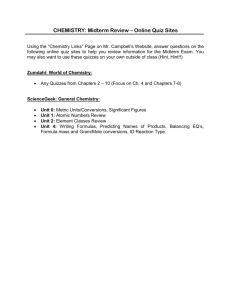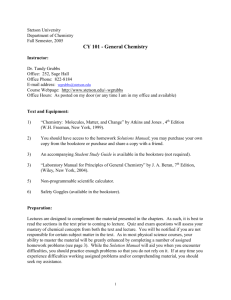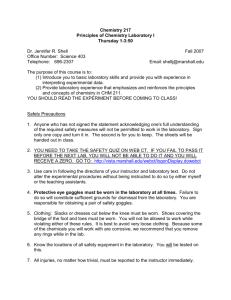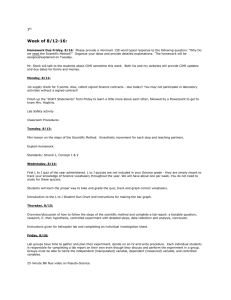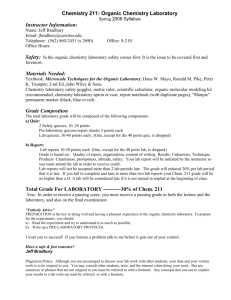CHEM 100 I01 - Great Basin College
advertisement
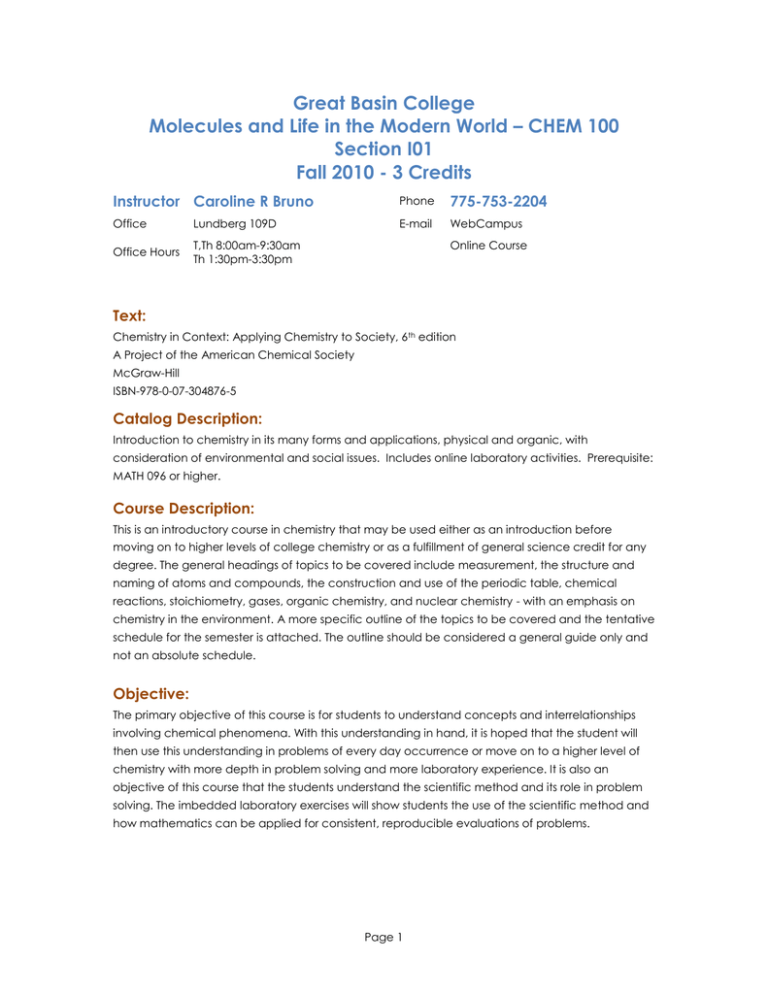
Great Basin College Molecules and Life in the Modern World – CHEM 100 Section I01 Fall 2010 - 3 Credits Instructor Caroline R Bruno Phone 775-753-2204 Office Lundberg 109D E-mail WebCampus Office Hours T,Th 8:00am-9:30am Th 1:30pm-3:30pm Online Course Text: Chemistry in Context: Applying Chemistry to Society, 6 th edition A Project of the American Chemical Society McGraw-Hill ISBN-978-0-07-304876-5 Catalog Description: Introduction to chemistry in its many forms and applications, physical and organic, with consideration of environmental and social issues. Includes online laboratory activities. Prerequisite: MATH 096 or higher. Course Description: This is an introductory course in chemistry that may be used either as an introduction before moving on to higher levels of college chemistry or as a fulfillment of general science credit for any degree. The general headings of topics to be covered include measurement, the structure and naming of atoms and compounds, the construction and use of the periodic table, chemical reactions, stoichiometry, gases, organic chemistry, and nuclear chemistry - with an emphasis on chemistry in the environment. A more specific outline of the topics to be covered and the tentative schedule for the semester is attached. The outline should be considered a general guide only and not an absolute schedule. Objective: The primary objective of this course is for students to understand concepts and interrelationships involving chemical phenomena. With this understanding in hand, it is hoped that the student will then use this understanding in problems of every day occurrence or move on to a higher level of chemistry with more depth in problem solving and more laboratory experience. It is also an objective of this course that the students understand the scientific method and its role in problem solving. The imbedded laboratory exercises will show students the use of the scientific method and how mathematics can be applied for consistent, reproducible evaluations of problems. Page 1 Method of Instruction: This is a fast-paced, rigorous internet course. PowerPoint Presentations available on WebCampus coincide with assigned reading material in the text and add clarification and examples to the material in the text. Learner Outcomes and Measurement: Expected Learner Outcomes Measurement Solve problems using the scientific method. Lab reports Demonstrate how chemistry is used to Lab reports, Chapter Quizzes understand and explain many of today’s environmental problems. Chemically analyze current and potential Chapter Quizzes energy sources. Analyze how chemistry is applied in the Chapter Quizzes. development of medicines, plastics and polymers. Analyze the chemistry of nutrition. Chapter Quizzes Analyze various types of chemical reactions Lab reports, Chapter Quizzes Demonstrate and analyze how genetic Chapter Quizzes engineering is used in our society. Calculate empirical and molecular formulas Lab reports, Chapter Quizzes Calculate chemical quantities Lab reports and Chapter Quizzes Evaluation: Chapter Quizzes: Students are required to complete quizzes associated with each chapter. Generally, quizzes will be available on Tuesdays through Sundays. Quiz availability will not be extended under any circumstances. Take quizzes from a computer with a speedy and reliable internet connection. Immediately contact the GBC Helpdesk if technical problems arise. Lab: Four labs will be completed by students in the comfort of their own kitchens! The lab reports are "gateway" requirements for this course; to receive a passing grade in this course, all labs must be handed in and receive a passing grade (A, B, or C). If any of the four labs are not handed in or do not receive a passing grade, a failing grade will be issued for the course. If any lab is handed in but does not receive a passing grade, the student will have one week to revise the lab to a passing grade (C only). If a lab is handed in late, the highest grade possible is a 70%. For every additional day the assignment is late, the highest possible percentage will drop by 10%. You may conduct the experiment with a fellow classmate, but you must write your own lab report and display and format your data independently. Page 2 Recommended ‘End of Chapter’ Questions: Your success in this course depends on active participation and active learning. At the beginning of each chapter, your professor will provide a list of recommended ‘End of Chapter’ (EOC) questions. Although these questions will not be graded, careful and accurately completion is necessary for success, as these questions will be similar to quiz questions. Answers to the ‘End of Chapter ‘questions will be posted online for students to review. Most of the EOC questions selected by your instructor will be quantitative (involving calculations) but keep in mind the student is responsible for all content in each chapter. Grading: Grading will be based on the Chapter quizzes and four lab reports. All scores will be added together at the end of the semester, and the percentage of the total possible points will determine the grade. Extra credit opportunities are not available. Grades will be based on the following divisions: A 95-100% A- 90-94% B+ 87-89% B 84-86% B- 80-83% C+ 77-79% C 74-76% C- 70-73% D+ 67-69% D 64-66% D- 60-63% F <59% A student may receive a “W” grade only if withdrawal occurs before the end of the thirteenth week of the semester. To withdraw, the student must inform the instructor verbally or in writing why the withdrawal is taking place, and must formally withdraw through student services. Anyone who does not formally withdraw and does not complete the course will receive an ‘F’ grade. ‘I’ grades for ‘incomplete’ will be given only under the most extenuating circumstances, and only with the prior approval of the instructor. Attendance Policy: It is important to log into the class frequently to stay up to date with reading, assignments and exams. It is the student’s responsibility to complete quizzes and turn in labs on time. Page 3 Hints for Success: In order to pass this course you MUST actively participate in your education and study! Keep up to date on reading. Although not required, be sure to complete all of the ‘Your Turn’ questions throughout the chapter. These question s will help you prepare for the ‘End of Chapter’ Questions and quizzes. Although not required, take the recommended ‘End of Chapter’ Questions seriously; they will help you prepare for exams! ASK questions if you are confused. Your professor wants to HELP you! Additional Course Information: The instructor will reply to WebCampus emails during posted office hours. If you have an urgent question requiring a timely response during school hours, call the instructor directly at 775-753-2204. In case your book hasn’t arrived by the start of semester, the first two chapters on the schedule are available via WebCampus. If you are unable to secure a book by the end of the third week of class, the instructor recommends withdrawing from the course and taking it another semester. Technical problems with WebCampus need to be addressed to the GBC Helpdesk. Extra credit opportunities are NOT available. Page 4 Student Conduct Policy: Students are expected to follow the Student Conduct Policy for students in the Nevada System of Higher Education (NSHE) outlined in the GBC Catalog. Students will specifically be held accountable for behaving in a civil and respectful manner toward other students and the professor in all communications. The college catalog states, “Messages, attitudes, or any other form of communication deemed to be outside the bounds of common decency/civility as judged by common standards of classroom behavior (determined, as they would be in a regular classroom, by the instructor) will not be tolerated” (29). Pay particular attention to those last four words. Any student who behaves rudely to another student or to the instructor will be dropped immediately. Academic Honesty: Academic dishonesty, in any form, such as, cheating and plagiarism, will not be tolerated by the instructor AND Great Basin College. Academic dishonesty can result in failing the class, academic suspension, or expulsion. All tests, quizzes, laboratories, and other assignments must be the student’s OWN work. Plagiarism is presenting someone else’s word, ideas or data as one’s own. When a student submits work that includes the words, ideas, or data of others, the source of that information must be acknowledged through complete, accurate, and specific references; and if verbatim statements are included, through quotation marks as well. In academically honest writing or speaking, the students will acknowledge the source whenever: Another person’s actual words are quoted Another person’s idea, opinion or theory is used, even if it is completely paraphrased in the student’s own words Facts, statistics, or other illustrative materials are borrowed, unless the information is common knowledge Students with Disabilities: The college catalog states, “Great Basin College is committed to providing equal educational opportunities to qualified students with disabilities in accordance with state and federal laws and regulations, including the Americans with Disabilities Act of 1990 and Section 504 of the Rehabilitation Act of 1973. A qualified student must furnish current verification of disability. The ADA Officer, located in Berg Hall, will assist qualified students with disabilities in securing the appropriate and reasonable accommodations, auxiliary aids, and services. For more information or further assistance, please call 775.753.2271” (36). Page 5 CHEM 100 Course Schedule for Fall 2010: Not a contract: This document does not in any way constitute a contract. It is only a summary of how the professor expects the course to proceed. In may be changed by the professor. Week Topics and Important Dates 1 –Aug 29 Chapter 1: The Air We Breathe 2 – Sept 5 Chapter 1: The Air We Breathe 3 – Sept 13 Chapter 2: Protecting the Ozone Layer 4 – Sept 19 5 – Sept 26 Chapter Quizzes and Important Dates Ch. 1 Quiz available Tuesday Sept 7-Sunday Sept 12 Ch. 2 Quiz available Tuesday Sept 14-Sunday Sept 19 Chapters 3: The Chemistry of Global Ch. 3 Quiz available Warming Tuesday Sept 21-Sunday Sept 26 Chapter 4: Energy, Chemistry, and Lab #1 Due Thursday, September 30 Society Ch. 4 Quiz available Tuesday Sept 28-Sunday Oct 3 6 – Oct 3 7 – Oct 10 8 – Oct 17 9 – Oct 24 10 – Oct 31 11 - Nov 7 12 - Nov 14 Chapter 5: The Water We Drink Ch. 5 Quiz available Tuesday Oct 5-Sunday Oct 10 Chapter 6: Neutralizing the Threat of Ch. 6 Quiz available Acid Rain Tuesday Oct 12-Sunday Oct 17 Ch. 7 Quiz available Chapter 7: The Fires of Nuclear Fission Tuesday Oct 19-Sunday Oct 24 Chapter 8: Energy from Electron Lab #2 Due Thursday, October 28 Transfer Chapter 8: Energy from Electron Ch. 8 Quiz available Transfer Tuesday Nov 2-Sunday Nov 7 Chapter 9: The World of Plastics and Ch. 9 Quiz available Polymers Tuesday Nov 9-Sunday Nov 14 Chapter 10: Manipulating Molecules Lab #3 Due Thursday, November 18 and Designing Drugs Ch. 10 Quiz available Tuesday Nov 16-Sunday Nov 21 Course Drop Deadline 13 – Nov 21 Chapter 11: Nutrition: Food for Thought November 26 Ch. 11 Quiz available Tuesday Nov 23-Sunday Nov 28 14 – Nov 28 15-Dec 5 Chapter 12: Genetic Engineering Lab #4 Due Thursday, December 2 Chapter 12: Genetic Engineering Final Quiz on Chapter 12 16-Dec 12 Different DATES!! Page 6 Tuesday Dec 7-Tues Dec 14 Substantiation of the Incorporation of the General Education Objectives into Chemistry 100 Communication Skills (strong component): Four complete lab write-ups on quantitative investigations (following the format of scientific investigation) are required. Students are encouraged to communicate via email or other means with other students and the instructor to discuss concepts covered in reading material and labs. Critical Thinking (strong component): Quantitative Ability (significant): Laboratories specifically require measurement, mathematic manipulation of the data, and the creation of graphs. Labs and quizzes will include dimensional analysis which requires mathematic manipulation. Reasoning and Independent Thought (significant): All lab exercises require reasoning and independent thought based on the interpretation of both qualitative and quantitative information. Students will be required to formulate conclusions in written laboratory reports using the scientific method. Many quiz questions require reasoning taken from the understanding and application of chemistry, not just the memorization of terms. Scientific Understanding (significant): All principles taught in this course are based on scientific reasoning. Interpretations are based on facts. The lab introduces the use of the scientific method and the use of both observational and quantifiable facts in its application. Personal and Cultural Awareness (moderate component): Sense of the Individual in Society (some degree): This objective is also reflected under the “Sense of Accountability” objective below. Different social attitudes toward the use of chemicals in different cultures and industry are reviewed. Quizzes will require students to demonstrate how consumer choices impact the chemistry of environmental problems. Sense of the Past (moderate): The nature of the atom has been of interest to scientists since the 1800s. This class will examine various models of the atom developed from the late 1800s through the present. Lectures will review notable experiments and people involved with the development of chemistry as a science. Sense of Accountability (significant): A common theme throughout much of this course is the interaction between humans and nature, and the personal and social consequences of these interactions. We discuss ethical and societal issues and needs relating to the use of industrial chemicals and the environment. Quizzes will require students to demonstrate how consumer choices impact the chemistry of environmental problems. Appreciation of Fine Arts (some degree): The use of chemicals in art restoration is a hot topic. For example, during the 1980’s and 1990’s, the cleaning and restoration of The Sistine Chapel created controversy in the art community because many art historians believed that the cleaning destroyed and/or distorted Michelangelo’s original work. The chapter 6 quiz will require students to demonstrate their knowledge of acid rain degradation to sculptures. Page 7 Personal Wellness (significant): Personal safety is considered in the discussion of laboratory safety and chemical hazards. Many of the environmental issues discussed in lecture, such as the chemistry of the ozone layer, the chemistry of water, and the chemistry of air, directly impact personal wellness. Quizzes will require students to demonstrate their knowledge of how the chemistry of environmental problems may impact their health. Technological Understanding (moderate): Laboratory reports and homework assignments will be produced using appropriate word processing and spreadsheet software. Students will use WebCampus to access class materials. Page 8
